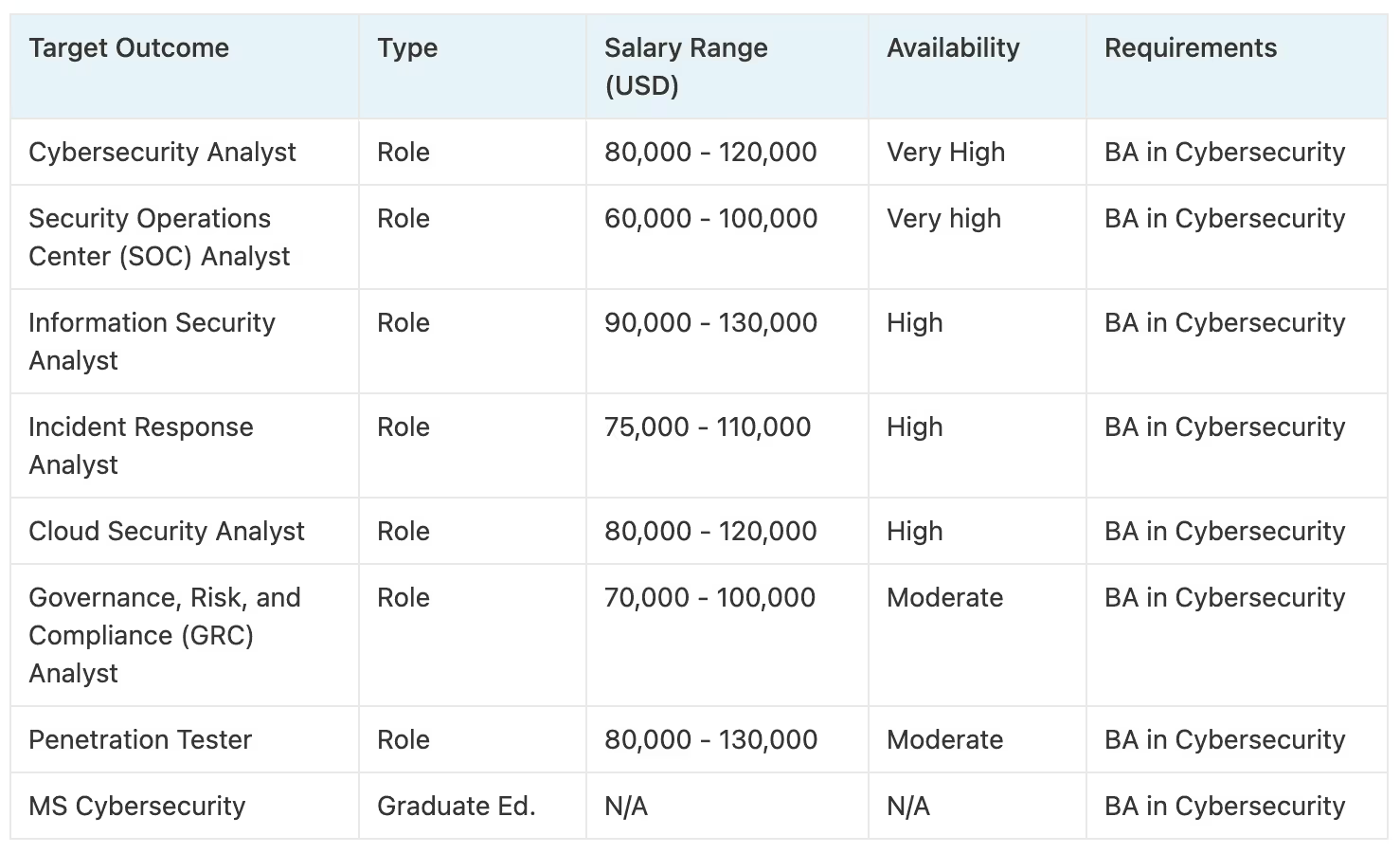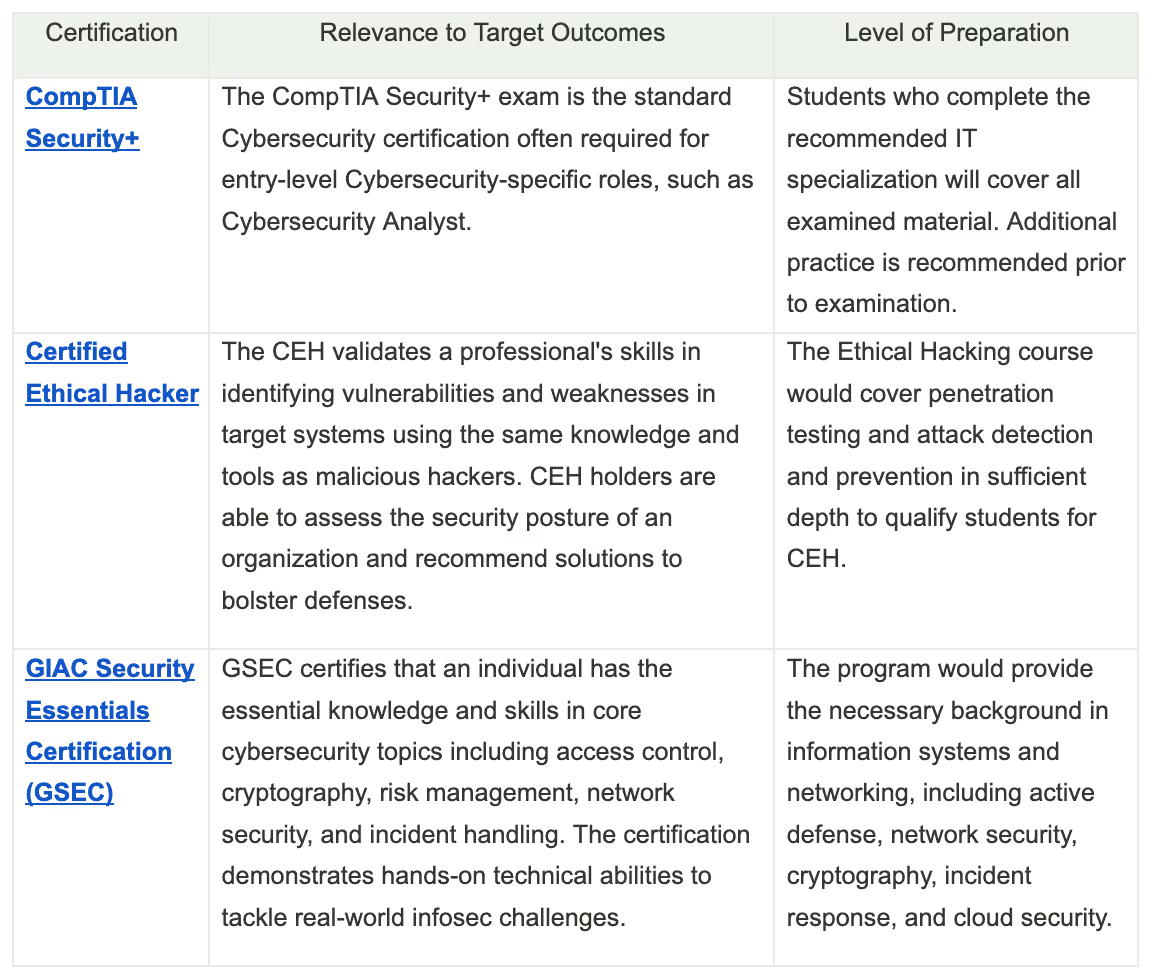Rize Program Spotlight: Cybersecurity
Learn how the Rize Cybersecurity academic program prepares graduates for real-word jobs by focusing on hands-on projects & industry certifications.

If you've ever updated your password to include a number or special symbol, or received a notification about a data breach or software hack, you've already encountered the basic principles of cybersecurity. Cybersecurity analysts work proactively to guard against threats by continuously monitoring digital systems and networks, investigate and report findings in the event of a breach, and seek solutions to make organizations safer.
By 2030, the U.S. Bureau of Labor Statistics predicts a staggering 30% growth in security roles, far outpacing the average growth rate for other occupations. As global internet access expands and organizations adopt new digital technologies, the need for a diverse community of security professionals with unique backgrounds and perspectives has never been greater. With countless openings for entry-level security analysts and employers struggling to find candidates with the right expertise, now is the perfect time to launch a degree program in Cybersecurity to prepare your students for this exciting field.
To further ensure graduates are well prepared for successful careers, we’ve updated our Cybersecurity curriculum as part of our ongoing program review and enhancement process. Below we share what makes our program unique and highlight the recent changes we’ve made.
Why the Rize Cybersecurity Program?
Our Cybersecurity program directly targets the huge growth in low or no-code Cybersecurity roles over the past 10 years. These roles require a deep understanding of the security landscape and experience with modern no-code tools, which are covered by this program.
Our program is frequently praised by students for its hands-on projects of simulated security scenarios, and the breadth and value of the tools taught. In Cybersecurity, simulation-based projects are typically viewed as the most valuable portfolio work for graduates.
This program is reviewed and revised every year to ensure that graduates achieve the most valuable skills possible.
Target Outcomes
The field of Cybersecurity has expanded rapidly in the past 10 years, and common graduate pathways have quickly solidified. The most common outcome for a Cybersecurity graduate is to enter an Analyst role with a focus on security. Most commonly, this role is labeled “Security Analyst”, but there may be varying focus on Cybersecurity topics depending on the organization Additional target outcomes are listed below.

Certifications
Our Cybersecurity program supports the following certifications:

Program Design Process
Like our other programs, Cybersecurity was developed leveraging our unique approach to curriculum development and course design, bringing together academic experts and industry leaders to form curriculum committees alongside instructional designers and instructors specializing in the online modality. Leveraging this collaborative approach, our Cybersecurity program was designed by:
- Defining target outcomes using labor market analytics from Lightcast and Gray Decision Intelligence, as well as industry research on comparable programs.
- Defining Program Learning Outcomes (PLOs) that the best serve the target outcomes for students, while considering:
- Accessibility for the students of the LCMC, with a range of academic backgrounds and subject exposure
- Relevance to the range of desirable outcomes,
- Value to the student in the long term.
- Defining Course Learning Outcomes (CLOs) and course sequence that best serve the Program Learning Outcomes.
- Defining assessments and syllabi that best assess the PLOs and CLOs, and aid students in building a portfolio of work that will differentiate them in selection processes.
Program Updates
In the latest curriculum enhancement, the program was more closely integrated with industry-recognized frameworks like NIST and MITRE ATT&CK to ensure relevance and comprehensiveness. Foundational cybersecurity skills, including governance, risk management, and compliance, are now covered in greater depth, and hands-on experience with industry-standard tools like Splunk and cloud services has been incorporated. The curriculum now places greater emphasis on incident response and recovery, preparing students for entry-level Security Operations Center (SOC) Analyst roles.
Additionally, cross-functional skills such as communication and ethical decision-making were integrated throughout the program. The curriculum now addresses emerging threats like social engineering and covers advanced topics including AI security, blockchain, and IoT security. While the program broadly prepares students for certifications like CompTIA Security+, it maintains a focus on providing a comprehensive educational journey beyond certification prep. These updates ensure our graduates are well-equipped to meet the evolving challenges of the cybersecurity landscape.
Summary
Rize’s career-focused Cybersecurity program provides students hands-on experience with common security tools like Splunk, teaches how to apply industry frameworks such as the NIST Cybersecurity Framework and MITRE ATT&CK, and develops the critical thinking skills needed to analyze security incidents in the real world. Students work on exciting projects like analyzing a major cybercrime through a digital forensic investigation, and execute penetration tests to simulate outside attacks and pinpoint system’s weaknesses. Along the way students learn how to showcase their skills to future employers, building a compelling portfolio and connecting with industry mentors to kickstart their career.
If you’re interested in learning more about offering Cybersecurity powered by Rize on your campus, request a call with our Academic Partnerships team.
Matthew's passion for his role at Rize stems from the desire to forge a connection between the intellectually enriching realm of the liberal arts and the realm of purposeful, meaningful work. Outside of his professional pursuits, Matthew finds joy in the simple pleasures of books, travel, and appreciating the world of wine.

Rize Program Spotlight: Cybersecurity
Learn how the Rize Cybersecurity academic program prepares graduates for real-word jobs by focusing on hands-on projects & industry certifications.
If you've ever updated your password to include a number or special symbol, or received a notification about a data breach or software hack, you've already encountered the basic principles of cybersecurity. Cybersecurity analysts work proactively to guard against threats by continuously monitoring digital systems and networks, investigate and report findings in the event of a breach, and seek solutions to make organizations safer.
By 2030, the U.S. Bureau of Labor Statistics predicts a staggering 30% growth in security roles, far outpacing the average growth rate for other occupations. As global internet access expands and organizations adopt new digital technologies, the need for a diverse community of security professionals with unique backgrounds and perspectives has never been greater. With countless openings for entry-level security analysts and employers struggling to find candidates with the right expertise, now is the perfect time to launch a degree program in Cybersecurity to prepare your students for this exciting field.
To further ensure graduates are well prepared for successful careers, we’ve updated our Cybersecurity curriculum as part of our ongoing program review and enhancement process. Below we share what makes our program unique and highlight the recent changes we’ve made.
Why the Rize Cybersecurity Program?
Our Cybersecurity program directly targets the huge growth in low or no-code Cybersecurity roles over the past 10 years. These roles require a deep understanding of the security landscape and experience with modern no-code tools, which are covered by this program.
Our program is frequently praised by students for its hands-on projects of simulated security scenarios, and the breadth and value of the tools taught. In Cybersecurity, simulation-based projects are typically viewed as the most valuable portfolio work for graduates.
This program is reviewed and revised every year to ensure that graduates achieve the most valuable skills possible.
Target Outcomes
The field of Cybersecurity has expanded rapidly in the past 10 years, and common graduate pathways have quickly solidified. The most common outcome for a Cybersecurity graduate is to enter an Analyst role with a focus on security. Most commonly, this role is labeled “Security Analyst”, but there may be varying focus on Cybersecurity topics depending on the organization Additional target outcomes are listed below.

Certifications
Our Cybersecurity program supports the following certifications:

Program Design Process
Like our other programs, Cybersecurity was developed leveraging our unique approach to curriculum development and course design, bringing together academic experts and industry leaders to form curriculum committees alongside instructional designers and instructors specializing in the online modality. Leveraging this collaborative approach, our Cybersecurity program was designed by:
- Defining target outcomes using labor market analytics from Lightcast and Gray Decision Intelligence, as well as industry research on comparable programs.
- Defining Program Learning Outcomes (PLOs) that the best serve the target outcomes for students, while considering:
- Accessibility for the students of the LCMC, with a range of academic backgrounds and subject exposure
- Relevance to the range of desirable outcomes,
- Value to the student in the long term.
- Defining Course Learning Outcomes (CLOs) and course sequence that best serve the Program Learning Outcomes.
- Defining assessments and syllabi that best assess the PLOs and CLOs, and aid students in building a portfolio of work that will differentiate them in selection processes.
Program Updates
In the latest curriculum enhancement, the program was more closely integrated with industry-recognized frameworks like NIST and MITRE ATT&CK to ensure relevance and comprehensiveness. Foundational cybersecurity skills, including governance, risk management, and compliance, are now covered in greater depth, and hands-on experience with industry-standard tools like Splunk and cloud services has been incorporated. The curriculum now places greater emphasis on incident response and recovery, preparing students for entry-level Security Operations Center (SOC) Analyst roles.
Additionally, cross-functional skills such as communication and ethical decision-making were integrated throughout the program. The curriculum now addresses emerging threats like social engineering and covers advanced topics including AI security, blockchain, and IoT security. While the program broadly prepares students for certifications like CompTIA Security+, it maintains a focus on providing a comprehensive educational journey beyond certification prep. These updates ensure our graduates are well-equipped to meet the evolving challenges of the cybersecurity landscape.
Summary
Rize’s career-focused Cybersecurity program provides students hands-on experience with common security tools like Splunk, teaches how to apply industry frameworks such as the NIST Cybersecurity Framework and MITRE ATT&CK, and develops the critical thinking skills needed to analyze security incidents in the real world. Students work on exciting projects like analyzing a major cybercrime through a digital forensic investigation, and execute penetration tests to simulate outside attacks and pinpoint system’s weaknesses. Along the way students learn how to showcase their skills to future employers, building a compelling portfolio and connecting with industry mentors to kickstart their career.
If you’re interested in learning more about offering Cybersecurity powered by Rize on your campus, request a call with our Academic Partnerships team.
Matthew's passion for his role at Rize stems from the desire to forge a connection between the intellectually enriching realm of the liberal arts and the realm of purposeful, meaningful work. Outside of his professional pursuits, Matthew finds joy in the simple pleasures of books, travel, and appreciating the world of wine.

